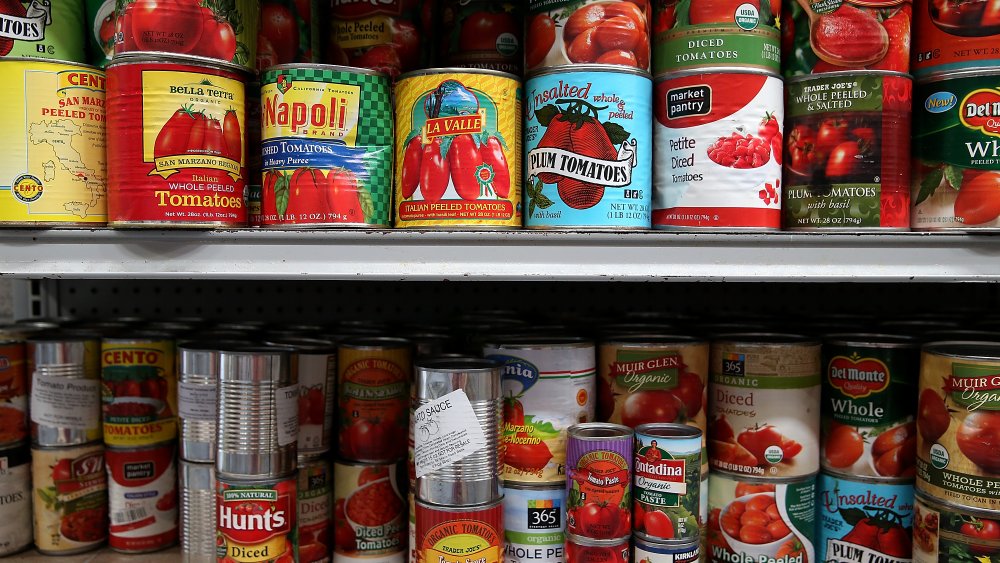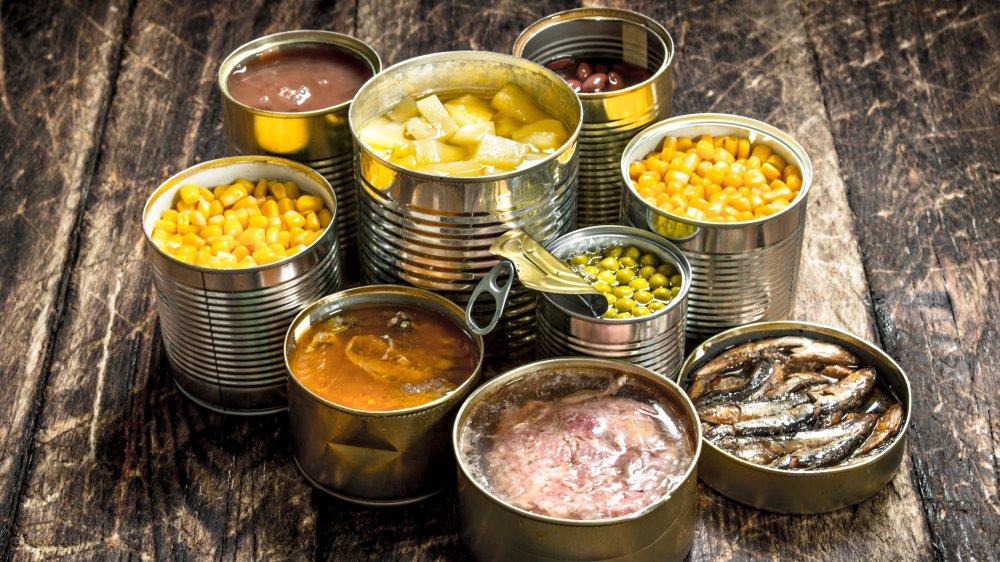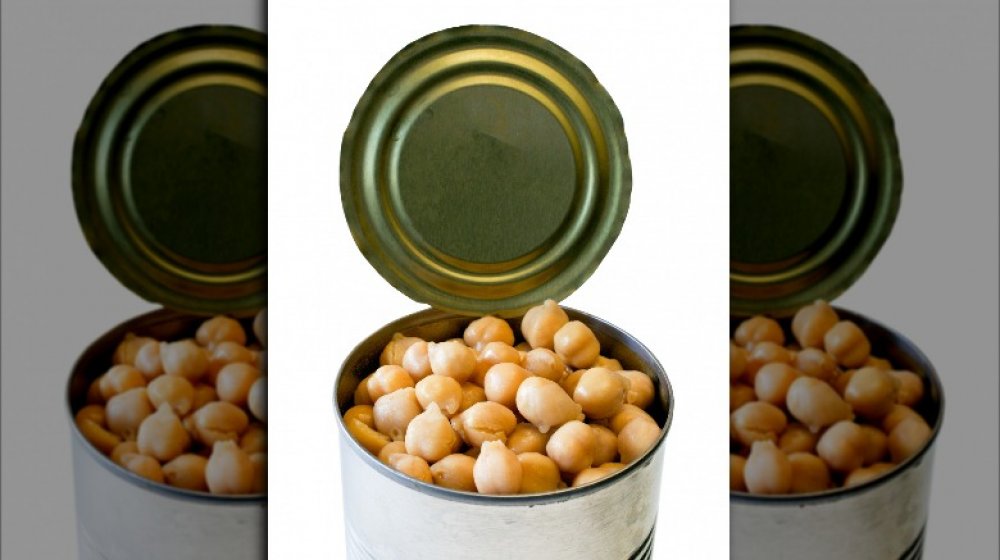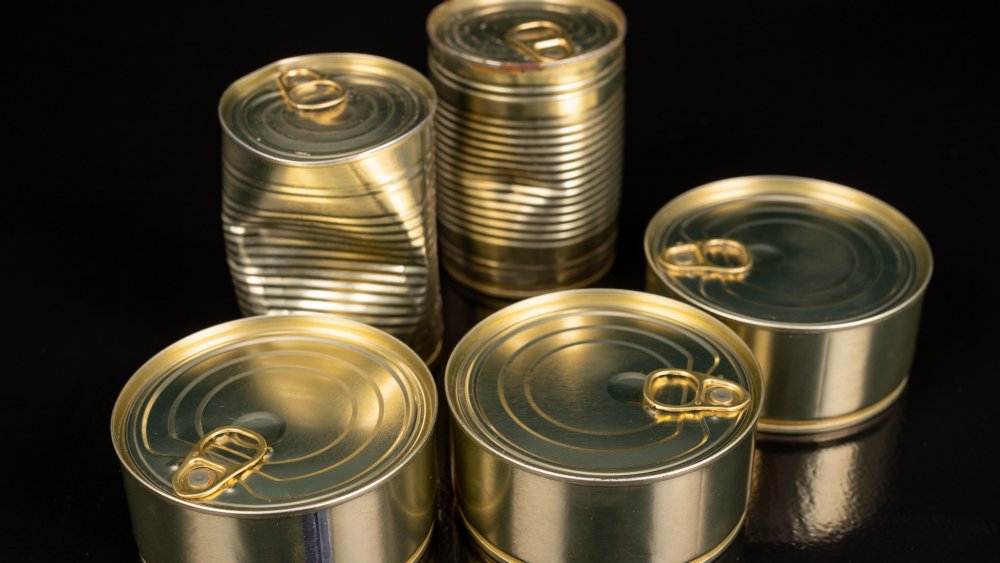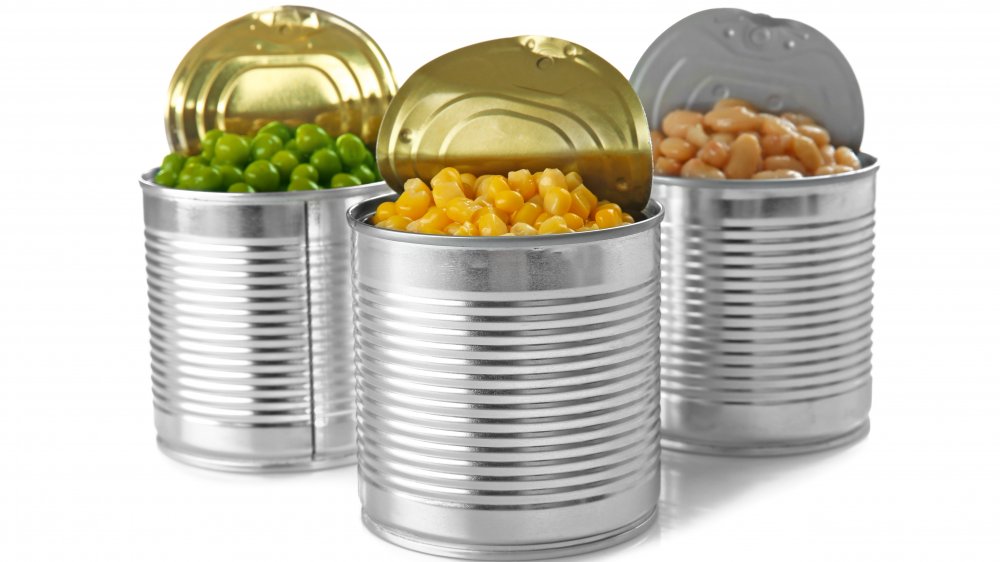Myths About Canned Food You Can Stop Believing
For many of us, canned goods are our last line of culinary defense – the stuff we cook if there is nothing left in the house or that we seek when we are gathering up provisions to prepare for bad weather. So much of this is because canned vegetables have a bad rap; part of this comes from our realization that a number of canned vegetables, such as asparagus, spinach, and beets, taste nothing like their fresh counterparts. We've also seen studies showing that a chemical that has historically lined cans is harmful to brain development (via How Stuff Works). There is also the belief that canned goods are high in sodium.
But if we choose wisely, canned goods can also deliver on taste and nutrition – canned chickpeas can be the base of a great hummus while its liquid, also known as aquafaba, is prized by vegans as an egg-white substitute. Canned tomatoes are a great starter ingredient for a memorable pasta sauce, and canned tuna is a go-to for people on high-protein diets.
So do canned goods deserve their reputation? We may need to debunk a few canned good myths, but we definitely think canned goods should be considered nutritional good guys because in many cases, that's what they are.
Myth: Canned goods aren't nutritious
Before you disregard any suggestions involving the use of canned vegetables because you've read somewhere that they just aren't as nutritious as fresh veggies, you might want to give those canned beans and tomatoes a second chance. One of the reasons why this method of food preservation became a thing was to maintain the integrity of an ingredient, which means that most of the proteins, carbs, and fat, as well as minerals, and fat-soluble vitamins like A, D, E, and K are able to survive the canning process. In some cases, like those involving tomatoes and corn, canning can end up encouraging the release of even more antioxidants, making them a better way to obtain antioxidants than their fresh counterparts (via Healthline).
Canned goods can only be nutritionally compromising if they have high levels of sugar or sodium, so you may want to check the nutrition labels before making your purchase. Nutritionists also say canned foods that have multiple ingredients, such as soups and pasta, will have problematic sodium content, so you're better off leaving those on the shelf and going for cans with only one food, like beans, tomato, tuna, and salmon (via Insider).
Myth: All canned goods are lined with BPA
It's true that a plastic lining called BPA, which mimics the effects of estrogen, has been used by food canners since the 1960s, and while the FDA banned this potentially harmful chemical in the manufacture of baby bottles and infant formula in 2012, it is still being used in the food canning industry today (via Insider). But industry representatives say the number of cans that still have BPA has fallen below ten percent, and most food can linings are now made with acrylic and polyester. These linings are important because they act as a barrier between food and the metal, which prevents bacteria from growing, keeps the can from corroding, and helps to maintain food quality (via Packing Digest).
It is possible to avoid BPA in canned goods "BPA as potential health risks which is why you want to look for cans that say 'BPA free.' Many companies have taken initiatives to remove BPA, however, I would still check the can," registered dietitian Maggie Michalczyk tells Well and Good.
Myth: All dented cans aren't safe to consume
We've all been taught to pick cans from supermarket shelves that are pristine and perfect. But dents happen, and when a can's perfection is marred, our first instinct is to dig deep into the shelf to look for a perfect can or make do without if it's the last can standing. But are all dented cans really bad for you? It depends, says Culinary Institute of America's associate professor of nutrition and food safety Suki Hertz. "If it's just a minor dent somewhere else on the can, it's not going to affect the food inside. I wouldn't be panicking. But if you have a dent and [the] dent is on the seam, you've broken the anaerobic condition of the can. Now pathogens can get in. It could cause a foodborne illness," Hertz tells Reader's Digest.
Dents on the seam, cans with bulging ends, as well as ones with sharp points and deep dents – which the USDA says you can lay your finger into when you're looking at the can – are the ones to avoid. Other than that, you're all set and good to go.
Myth: Canned food isn't good after its 'expiration' date
While it can seem that your canned food's "use by" or "best by" date is pretty far away when you buy it, if you rifle through your supply months down the road and find a can with a date that is rapidly approaching or is long past, you might be tempted to chuck it in the garbage. After all, doesn't that date mean that the food is no good once it's passed you by on the calendar?
Not necessarily. "Canned foods do not expire on a certain date," explained Ron Giles, quality assurance director of Goya Foods, Inc. (via Today). "One cannot say that the canned food is good on one day and not good the next day. Canned foods are under a vacuum. The absence of oxygen helps to extend the shelf life of canned foods."
If you notice a "best by" date instead of "use by" date, then you might be met with a product that doesn't taste quite as good as it might have a few months earlier, but it's not "expired." Lisa Peterson, Nutrition and Wellness Educator with the University of Illinois Extension, agrees, saying canned food is safe for quite a long time on your cabinet shelves as long as a few conditions are met, such as being kept in a relatively stable temperature. "The main concern with canned food is quality over time," she said. "If the can is bulging, rusted, or deeply dented, it's best to toss it out as this could be a sign of harmful bacteria growing."
